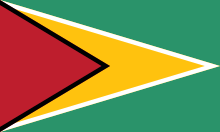
Back جيانيين ARZ Orang Guyana ID 가이아나인 Korean ഗൈനീസ് ജനത Malayalam Gvajanci Serbo-Croatian கயானா மக்கள் Tamil Гаянці Ukrainian
 | |
| Total population | |
|---|---|
| c. 1,250,000 | |
| Regions with significant populations | |
| 323,052[1] | |
| 84,275[2] | |
| 40,872[1] | |
| 14,560[1] | |
| 11,530[1] | |
| 7,401[1] | |
| 6,038[3] | |
| 6,657[1] | |
| 4,647[1] | |
| 5,197[1] | |
| 2,549[1] | |
| 2,427[1] | |
| 2,111[1] | |
| 4,000[4] | |
| 2,000[4] | |
| Languages | |
| English, Guyanese Creole, Guyanese Hindustani, Tamil, Chinese, Portuguese, Spanish, Dutch, French, Indigenous languages | |
| Religion | |
| Christianity (Roman Catholicism and Protestantism), Hinduism, Islam, Rastafari, Baháʼí, Buddhism, Afro-American religions, Traditional African religions, Chinese folk religion (Taoism and Confucianism), Amerindian folk beliefs | |
The people of Guyana, or Guyanese, come from a wide array of backgrounds and cultures including aboriginal natives, African and Indian origins, as well as a minority of Chinese and European descendant peoples. Demographics as of 2012 are Indo-Guyanese 39.8%, Afro-Guyanese 30.1%, mixed race (mostly Dougla) 19.9%, Amerindian 10.5%, other 1.5% (including Chinese and Europeans, such as the Portuguese). As a result, Guyanese do not equate their nationality with race and ethnicity, but with citizenship. Although citizens make up the majority of Guyanese, there is a substantial number of Guyanese expatriates, dual citizens and descendants living worldwide, chiefly elsewhere in the Anglosphere.
Located on the northern coast of South America, Guyana is part of the main land Caribbean which is part of the historical British West Indies. It is culturally similar to Suriname and nearby island nations of the Caribbean such as Trinidad and Tobago, and is a culturally Caribbean country even though it is not an island nation located in the Caribbean Sea.[5]
The national anthem of Guyana, Dear Land of Guyana, of Rivers and Plains, refers to Guyana as the "Land of six peoples"[6] which was historically considered to be made up of African, Indian, Chinese, Portuguese, European, and Amerindian people.[7]
- ^ a b c d e f g h i j k "Guyana – Emigrantes totales 2019" (in Spanish).
- ^ Government of Canada, Statistics Canada (8 February 2017). "Census Profile, 2016 Census – Canada [Country] and Canada [Country]". www12.statcan.gc.ca.
- ^ "Antigua and Barbuda::Statistics Division/Redatam Webserver | Statistical Process and Dissemination Tool".
- ^ a b "Immigrant and Emigrant Populations by Country of Origin and Destination".
- ^ "Guyana – The World Factbook". www.cia.gov. Retrieved 2021-02-09.
- ^ Loza, Léna (2007-05-01). "Le Guyana: "Land of Six Peoples" ou "One People, One Nation" ?". Caliban. French Journal of English Studies (in French) (21): 81–89. doi:10.4000/caliban.1872. ISSN 2425-6250.
- ^ Agriculture, United States Congress House Committee on (1965). Amend and Extend the Sugar Act of 1948: Hearings Before the Committee on Agriculture, House of Representatives, Eighty-ninth Congress, First Session, on H.R. 10496. U.S. Government Printing Office.
© MMXXIII Rich X Search. We shall prevail. All rights reserved. Rich X Search